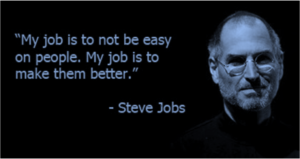The Point: We’ve talked about how as a leader, it’s “lonely at the top.” Well, guess what? If as a leader you attempt to do everything all the time in and of just yourself, your tenure as a leader will be a short one! As the saying goes, “it takes a village” so it goes that it takes a “team” to compete and succeed in today’s economy. Likewise, while a C-Suite executive can undergo personal executive coaching, this alone doesn’t guarantee the success of the company. To achieve that, the executives should assume coaching responsibilities and instill a culture of employee development in the company… In other words, act as an executive coach as a leader. What follows are 5 Keys we’ve identified at Tip of the Spear to help you as a leader develop just such a culture, and coach your way to success… Enjoy!
#5 Build or Bust Trust
It has often been seen in organizations that while employees are willing to learn, this willingness doesn’t automatically make the training process effective. A major issue is a trust barrier between leaders and their employees. If you want to coach in-house talent to occupy future C-suite executive seats (you do have a succession plan, don’t you?), then you have to start building relationships with your key employees. When the employees trust their leader as coach, they will learn more effectively.
#4 Become a Great Listener
As a leader, you may be proficient in reading, writing, and speaking, but now it is time to exercise arguably the greatest of all leadership communication skills: listening. This might entail you shunning your personal judgments and opinions in order to listen actively, paying special attention to the body language of your stakeholder. I know that every leader would like to be Steve Jobs-like, and fire off at the mouth with little regard for their employees, but let’s leave that to Steve…
#3 Continuous Evaluation
One-way instruction doesn’t work when it comes to effective coaching. When you get started, you need to outline the goals for training and also determining how far you are from achieving those goals (Think of it as a form of “gap” analysis you’ll conduct). You have to highlight behavioral changes that you both would like to see in the employee being trained, and then provide feedback from time to time to let them know how well they’re doing.
#2 Asking Powerful Questions
Effective executive coaching teaches people to think in the right direction, or manner. You need to ask your employees the right of kinds of questions to enhance their problem solving skills (Think of these as “powerful” questions). Make sure that these questions are clear and concise (ideally 7 words or less), they should be open-ended, should test the knowledge gained through previous coaching sessions and experience, and they should help the trainee move further towards reaching their goals.
#1 Criticize – Dish and Receive!
Finally, you need to support your stakeholders with active listening and encouraging them by being open to their suggestions. However, you should never withhold your criticism when they are not showing progress (Please pay note to my Steve Jobs-like comments above). However, you have to use constructive criticism, which means you express your opinion honestly without being confrontational. Remember that the stakeholder is being coached to become a future leader where they will have to make their own decisions. So, do rock their boat from time to time and encourage them to use their best judgment to accomplish goals.
Summary
Ultimately, the effectiveness of any coaching program as a leader is judged by results, and these can only be achieved if you follow the aforementioned guidelines when developing a leadership development program. In the end, your work with stakeholders can be dramatically improved by your leadership skills as a leader.
If you’d like more information on the Centered Executive Coaching programs offered at Tip of the Spear, or any of our other Business Advisory Services including Leadership Development and Communication Skills Training for Leaders, please use the CONTACT US page of this website.




